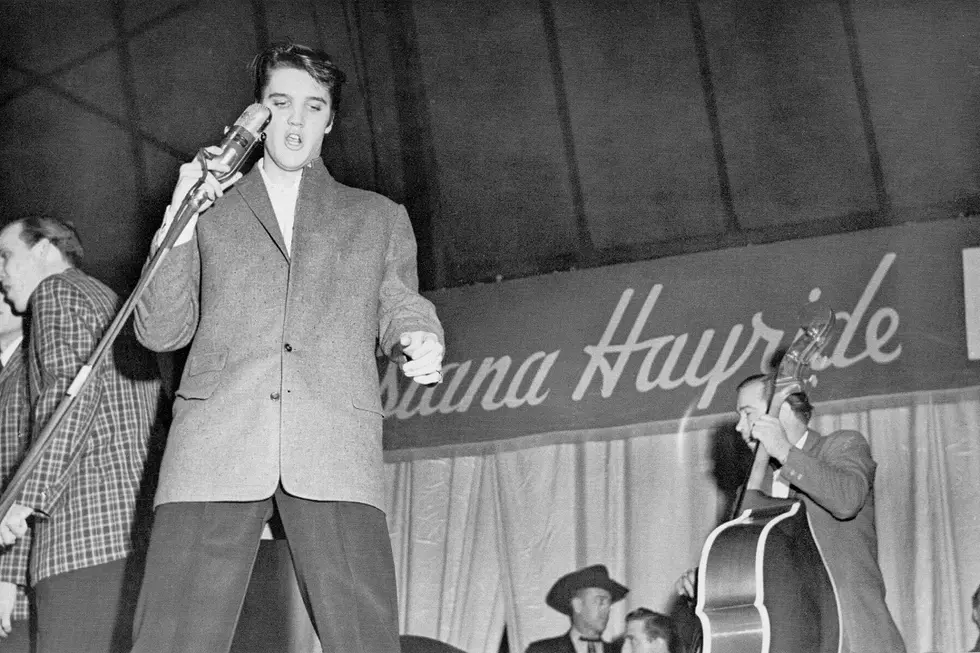
Top 5 Roy Acuff Songs
Jimmie Rodgers deserves credit for innovating the role of a touring, band-leading solo star. Yet it’s Roy Acuff who turned top billing into a glamorous lifestyle chased in the coming years by Ernest Tubb and others. Along the way, Acuff’s captivating vocal delivery and electrifying stage presence made him the heart and soul of one of country music’s longest running and most revered institutions, the Grand Ole Opry.
Born on Sept. 15, 1903, in Maynardville, Tenn., Roy Claxton Acuff’s musical journey began in 1932, when he joined a traveling medicine show. His fiddling skills, plus an innate ability to balance his fiddle and its bow on his chin, made the youngster an asset for his huckster boss.
By the 1940s, regional radio fame and powerful renditions of traditional tunes “The Great Speckled Bird” and “Wabash Cannonball” positioned Acuff and his Smoky Mountain Boys to become Opry mainstays. It didn't hurt that Acuff regularly cried during performances of songs about home and family, lending authentic emotion to early country music's most beloved radio program.
"I like to think I was the first person to bring voice to the Opry," Acuff once said, per his New York Times obituary. "I was one of the first fellows who reared back and hit a microphone with a strong voice."
Acuff made a business decision in 1942 that overshadows the importance of any hit or Opry-related radio broadcast, touring show or television program that followed, however: That year, he put up $25,000 made from the sales of songbooks to invest in Nashville’s first publishing company, Acuff-Rose, with the influential songwriter, publisher, producer and talent scout Fred Rose. Within six years, the company scored one of the sweetest deals in country music history when it landed an exclusive songwriter’s contract with Hank Williams. The company kept the Acuff family wealthy while setting part of the Music Row business blueprint for decades to come.
In 1943, Tennessee Gov. Prentice Cooper's public dismissal of country music inspired Acuff to run the following year in both the Democratic and Republican primaries as a protest candidate. He failed to secure either nomination, but in 1948, Acuff won the Republican primary. Despite the Opry star's celebrity status, however, opponent Gordon Browning won with 67 percent of the vote.
After World War II, honky-tonk- and crooner-style artists put a dent in Acuff’s popularity — while also helping his beloved Opry and lining his pockets through Acuff-Rose. That didn’t slow Acuff down one bit: He embraced perhaps the first elder statesman role granted to a star performer and continued reigning as one of at least four historic “kings” in country music, a crown worn at different times by Bob Wills, George Strait and Elvis Presley.
The greatest showing of respect and trust for Acuff came in 1971, when his involvement in the Nitty Gritty Dirt Band's classic album Will the Circle Be Unbroken taught fans and fellow Nashville stars that it’s okay to embrace long-hairs with good taste in music. Acuff helped secure the Dirt Band a much warmer Music City welcome than that received by the Byrds in 1968.
Acuff died on Nov. 23, 1992. By then, the 89-year-old legend’s professional obligations revolved around OpryLand USA, the theme park that literally served as Acuff's home in his final years (he lived in a house on the property).
In 1962, Acuff became the first living person inducted into the Country Music Hall of Fame; he was part of the hall's second class, with the inaugural class including Williams, Rodgers and a surname forever synonymous with Acuff’s, Rose. With Acuff's incomparable legacy in mind, check out these five must-hear classics.
- 5
"Old Time Sunshine Song"
1974This much later single proved that Acuff could still cut the mustard well into the 1970s. Acuff-Rose writer and future country star Eddy Raven wrote the lyrics in line with the old-time sentiments once shared by high-wattage WSM and the Grand Ole Opry.
- 4
“Automobile of Life”
Circa 1940This musical equivalent of a sermon outline used some analogies relating to the ups and downs facing the earliest automobile owners. Flaunting a status symbol sounded like a real drag. Simultaneously, Acuff sells patience through prayer as worthwhile.
- 3
"Night Train to Memphis"
Circa 1943This title track from a 1946 film starring Acuff incorporates pretty much all of the performer’s old-time tropes. It’s a white-hot fiddle tune and showcase of one of early country music’s best backing bands, with lyrics about trains, hoedowns and shouts of “Hallelujah!”
- 2
“Wabash Cannonball”
1936Acuff built his image on selecting the right older songs to cover. With “Wabash Cannonball,” he tugged at the heartstrings of older folks with memories of its original version, “The Great Rock Island Route,” while thrilling the radio generation with the showmanship that landed him atop the Opry heap.
- 1
"The Great Speckled Bird"
1936Acuff’s storied take on this gospel tune, penned by Rev. Guy Smith, teaches us a lot about how early sacred and secular country songs borrowed from each other. The song’s melody appeared before Acuff’s career in the Carter Family's “I’m Thinking Tonight of My Blue Eyes.” It got recycled again in 1952 as Hank Thompson’s “The Wild Side of Life” and the Kitty Wells answer song “It Wasn’t God Who Made Honky Tonk Angels.” The tie between all four songs gets infamously noted in David Allan Coe's “If That Ain’t Country.”
More From AM 950 KOEL










